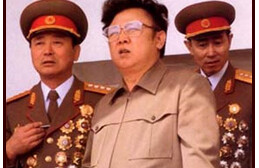The North Korean regime has been called a rogue state, part of the axis of evil, and even the last bastion of Stalinism. All of these labels have some ring of truth to them, but they also obscure a more important point: North Korea is home to 22 million people who are desperately trying to survive in a situation of chronic shortages and political oppression.
The nature of the regime and the security threat posed by its pursuit of nuclear weapons make developing an ethical approach toward the country a challenge. The temptation to focus on regime change as the solution to all the problems posed by Pyongyang is strong. But attempts to overthrow the regime or squeeze it into submission risk doing more evil than good for ordinary North Koreans.
Faced with this dilemma, policymakers seeking an ethical approach to North Korea should begin with a degree of humility. The fate of Kim Jong-il's regime is highly unlikely to be decided by what anyone does in Washington. The failure of 50 years of sanctions and pressure to oust Fidel Castro, who at 80 and in poor health remains in power in Cuba, should provide a lesson in the limitations of U.S. policy in affecting political change abroad.
Instead of worrying about the regime, an ethical policy approach should focus on improving the well-being and security of Koreans on both sides of the Demilitarized Zone (DMZ). To this end, an ethical North Korean policy should follow five basic rules.
1. Take War off the TableWhile for strategic reasons it might be necessary to leave all options on the table in dealing with North Korea's nuclear program, in reality the cost in human lives of a second Korean War would be prohibitive. Besides the likelihood of high casualties in the militaries of both sides, millions of civilians in North and South Korea would be at risk. The North Korean leadership has been preparing for the next war for more than 50 years, and is too well dug-in for precision strikes to have any effect. The International Commission on Intervention and State Sovereignty, in drawing up rules for justified humanitarian intervention, concluded:
Military intervention is not justified … if the consequences of embarking upon the intervention are likely to be worse than if there is no action at all. In particular, a military action for limited human protection purposes cannot be justified if in the process it triggers a larger conflict.("The Responsibility to Protect: Report of the International Commission on Intervention and State Sovereignty.")
Under this criterion, military action cannot be justified on the Korean Peninsula, whether to put an end to the nuclear program or human rights abuses.
2. Stop Using Food as a WeaponDuring the height of the North Korean famine from 1995 to 2002, the United States was the leading donor to the World Food Programme's projects in the country. In recent years, however, U.S. donations have shrunk, drying up entirely since 2005.
Ostensibly, the cut-off is a response to reports of diversion of aid. While every effort should be made to ensure that food aid gets to its intended recipients, some degree of diversion is inevitable in any aid situation. There is ample evidence that food aid has benefited ordinary North Koreans—most notably the improvement in mother and child health demonstrated in UNICEF nutritional surveys from 1998 and 2004. (PDF: DPRK 2004 Nutrition Assessment: Report of Survey Results)
In contrast, there is little evidence that food aid helps prolong the survival of Kim Jong-il's regime, or that cutting it off causes the government to divert resources from the military to feeding its people. The only consideration for providing food aid should be whether it will help alleviate the chronic hunger of the people in North Korea.
3. Put Human Rights in its PlaceImproving the horrendous human rights situation in North Korea is an urgent task. Unfortunately, the more isolated North Korea becomes, the less leverage the international community has to affect change there. Trying to address the problem through the imposition of sanctions is ineffective at best, and counterproductive at worst. A dilemma is therefore presented of needing to engage North Korea enough to increase the amount of leverage needed to address human rights concerns, while at the same time not providing the country with all the full benefits of membership in the international community until it improves its human rights practices.
Human rights can and should be an integral part of an overall dialogue with North Korea. That does not mean that progress in other areas, particularly in the security realm, should be held hostage to progress in human rights. Ridding North Korea of nuclear weapons and improving the overall security situation on the peninsula will have real benefits for the people on both sides of the DMZ, and thus should be pursued vigorously.
Additionally, increasing tension in the region provides the regime with a rhetorical excuse to continue to suppress freedoms under the name of protecting national sovereignty. But for other areas of engagement with North Korea, such as normalization of diplomatic relations or entry into international institutions or trade agreements, improvement in human rights should be a required condition.
4. Adhere to International StandardsNorth Korea often makes claims to exceptionalism. It justifies its failure to adhere to its treaty obligations on the grounds of being under constant threat of attack by the United States, or due to its practice of its own style of socialism. To counter that claim, the United States and other negotiating partners should insist that North Korea adhere to international norms in all interactions with the outside world, whether those be in the form of aid, trade, or membership.
Such an approach would be significantly more effective if the United States were to do a better job of adhering to its own international obligations, particularly when it comes to arms control treaties. The United States and the other four recognized nuclear powers (Britain, China, France, and Russia) have made little progress toward the complete disarmament envisioned by Article VI of the Treaty of the Non-Proliferation of Nuclear Weapons (NPT) .
As former British Foreign Secretary Margaret Beckett noted during her recent speech to the Carnegie Endowment's annual nonproliferation conference , this lack of progress knocks the United States and its allies off of the moral high ground. "And if we do not [do more], we risk helping Iran and North Korea in their efforts to muddy the water, to turn the blame for their own nuclear intransigence back onto us. They can undermine our arguments for strong international action in support of the NPT by painting us as doing too little too late to fulfil our own obligations," she said.
5. Listen to SeoulFor much of the past six years, the United States has been at odds with South Korea over the proper approach toward North Korea, with Seoul favoring engagement over confrontation. In response, some proponents of a hard-line policy have pushed for ignoring Seoul altogether and pursuing a course of regime change with or without South Korean help.
Such an approach is unethical in two respects. First, it is South Korea that will bear the brunt of any upheaval on the Korean Peninsula, be it a war or the collapse of the Kim Jong-il regime. It is only proper that Seoul have a major say in deciding the proper approach toward Pyongyang. Indeed, short of preventing the detonation of a North Korean nuclear weapon on American soil, which remains a very low order probability, it's difficult to imagine a more important goal for U.S. policy toward North Korea than safeguarding the lives of the citizens of its ally in the south.
Second, as one of the countries (along with the former Soviet Union and to a certain degree Japan) that was originally responsible for the division of the Korean Peninsula, the United States has a moral obligation to support Korean reunification, which is the ultimate goal of South Korea's policy of engagement with North Korea.
For all its difficulties, engagement remains the best hope for solving the problem that is North Korea. The hope is that, through engagement, the North Korean economy can be gradually revitalized to improve the lives of ordinary North Koreans and to shrink the gap between the two halves of the peninsula, thus reducing the long-term costs associated with unification. Doing this in a way that does not aid and abet the Pyongyang regime's ability to continue to suppress its own people or threaten its neighbors is a daunting challenge that requires a clear moral compass and a focus on long-term goals.




